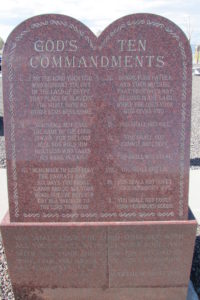These are two interesting questions. There are many ancient documents that have been determined to be historically accurate but would not be considered a reliable guide to morality. Josephus and Tacitus are examples of two historians that are usually considered to be accurate in their accounts of historical events. Neither man, though, seems to be trying to provide a moral guide in their writings.
Other writings might be judged to be a wonderful guide to morality but are not historically accurate. The Gospel of Thomas would be an example of this. No scholars believe that the Apostle Thomas wrote this document. There are sections of this writing that many scholars would discount as being historically accurate. At the same time, however, the Gospel of Thomas contains many statements from Jesus that correspond to the four Gospels that are in the New Testament. Most of Jesus’ statements in the Gospel of Thomas are good, moral statements.
How then does the Bible fit into these two categories?
First of all, is the Bible historically accurate? It is important to understand that ancient writers were not subject to modern rules of historic interpretation. This does not mean that they were not recording historical events, but it does mean that they were not interested in answering the historic questions that modern readers would be interested in. The book “Peter and Paul in Acts” discusses this question of historicity at length.
There are two primary ways to verify the historicity of a document.
The first is whether or not the contents of the document are verified or confirmed by another ancient document. Over and over again, the writings of the New Testament have been shown to be historically accurate as they have been compared to other writings from the same time period. One example of this would be the Jewish historian, Josephus’, writings. While he does not give a long, detailed account of Christianity, he does verify that a man named “Jesus” was crucified during the governorship of Pontius Pilate.
 A second way that the historicity of an ancient document is verified is through archaeological discoveries. Many of the archaeological discoveries that have been made over the last couple of hundred years have served to confirm many of the things that are recorded in the New Testament. One example of this is the famous Erastus inscription that was discovered in Corinth in 1929. The Apostle Paul referred to Erastus in Romans 16:23 as the Corinthian Director of Public Works. The context in which Paul refers to him clearly shows him to be a key member of the Corinthian Church. The Erastus inscription was found on a marble paving stone in the ruins of ancient Corinth. This inscription describes Erastus as “the Commissioner of Public Works.” It appears that this inscription confirms Paul’s letter to be historically accurate.
A second way that the historicity of an ancient document is verified is through archaeological discoveries. Many of the archaeological discoveries that have been made over the last couple of hundred years have served to confirm many of the things that are recorded in the New Testament. One example of this is the famous Erastus inscription that was discovered in Corinth in 1929. The Apostle Paul referred to Erastus in Romans 16:23 as the Corinthian Director of Public Works. The context in which Paul refers to him clearly shows him to be a key member of the Corinthian Church. The Erastus inscription was found on a marble paving stone in the ruins of ancient Corinth. This inscription describes Erastus as “the Commissioner of Public Works.” It appears that this inscription confirms Paul’s letter to be historically accurate.
Another interesting archaeological discovery added credibility to the historicity of the New Testament book of the Acts of the Apostles. In Acts 18; 11-17 the author of Acts refers to Gallio as being the Roman proconsul of Achaia while Paul was in Corinth. Around 1905 an inscription was discovered at Delphi which referred to Gallio as the proconsul of Achaia in 51 AD. This position was normally only a one-year appointment. This inscription serves to verify Acts as being historically accurate in what the author recorded. This archaeological discovery also provides the reader with a specific date for Paul’s ministry in Corinth and helps to provide a chronology for his ministry. William Ramsay’s classic book, “St. Paul the Traveler and Roman Citizen,” highlights a number of other important archaeological discoveries.
The second question that is present in the title asks whether or not the Bible is a reliable guide to morality. For this question, one only needs to look at the history of the Scriptures. Throughout the centuries, the Bible has been regarded as a guide for morality. The universal nature of their teaching has made them applicable to peoples in many different cultures and in many different eras.
The Ten Commandments are found in Exodus 20:1-17.
While the Ten Commandments have created controversy over the last several years, they still form the basis for many of the laws that most countries have adopted. In His own teaching, Jesus never tried to abolish the Ten Commandments.
 He did, however, simplify them. In Mark 12:28-34, Jesus was asked by a religious leader what the greatest commandment was. Jesus said that there were actually two. The first was that we were to love God with all of our heart, soul, mind, and strength. The second one was to love our neighbor as we loved ourselves. Not many people would find fault with Jesus’ words. In exploring the idea of morality, the concept of loving one’s neighbor as one loves oneself would seem to solve many of society’s problems.
He did, however, simplify them. In Mark 12:28-34, Jesus was asked by a religious leader what the greatest commandment was. Jesus said that there were actually two. The first was that we were to love God with all of our heart, soul, mind, and strength. The second one was to love our neighbor as we loved ourselves. Not many people would find fault with Jesus’ words. In exploring the idea of morality, the concept of loving one’s neighbor as one loves oneself would seem to solve many of society’s problems.
Benjamin Franklin is often regarded as one of the greatest inventors of all time and is known for his short, pithy statements on wisdom. Franklin never claimed to be a Christian. He did, however, regularly read the Bible and believed that it held the keys to morality and wisdom. In the middle of the Bible is the Book of Proverbs, thought to be written by King Solomon, one of the wisest men to ever live. Even a superficial reading of Proverbs would provide the reader with some excellent advice and insights into life.
The Bible was written over a long period of time.
The writings of Scripture also were affected by different cultures. The entire Bible was written in three different languages, Hebrew, Aramaic, and Greek. And yet, there is a common thread running through the Bible that seems to unite it in its view of life and morality. In the Scriptures, one finds life, wisdom, and hope. In a very real sense, lurking within its pages, one might even find God.






